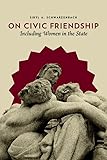On Civic Friendship : Including Women in the State / Sibyl Schwarzenbach.
Material type: TextPublisher: New York, NY : Columbia University Press, [2009]Copyright date: ©2009Description: 1 online resource (360 p.)Content type:
TextPublisher: New York, NY : Columbia University Press, [2009]Copyright date: ©2009Description: 1 online resource (360 p.)Content type: - 9780231147231
- 9780231519489
- 320.973082
- HQ1236.5.U6 S39 2009
- HQ1236.5.U6 S39 2009
- online - DeGruyter
- Issued also in print.
| Item type | Current library | Call number | URL | Status | Notes | Barcode | |
|---|---|---|---|---|---|---|---|
 eBook
eBook
|
Biblioteca "Angelicum" Pont. Univ. S.Tommaso d'Aquino Nuvola online | online - DeGruyter (Browse shelf(Opens below)) | Online access | Not for loan (Accesso limitato) | Accesso per gli utenti autorizzati / Access for authorized users | (dgr)9780231519489 |
Browsing Biblioteca "Angelicum" Pont. Univ. S.Tommaso d'Aquino shelves, Shelving location: Nuvola online Close shelf browser (Hides shelf browser)

|

|

|

|

|

|

|
||
| online - DeGruyter Factory of Strategy : Thirty-Three Lessons on Lenin / | online - DeGruyter Pasta : The Story of a Universal Food / | online - DeGruyter The Islamic Context of The Thousand and One Nights / | online - DeGruyter On Civic Friendship : Including Women in the State / | online - DeGruyter Global Population : History, Geopolitics, and Life on Earth / | online - DeGruyter Love and Liberation : Autobiographical Writings of the Tibetan Buddhist Visionary Sera Khandro / | online - DeGruyter Queer Beauty : Sexuality and Aesthetics from Winckelmann to Freud and Beyond / |
Frontmatter -- Contents -- A Paradox of Democracy -- Acknowledgments -- 1. Introduction: Metaphor and Theory Change -- Part I. The Past -- 2. The Forgotten Category of Ethical Reproduction -- 3. The Liberal Production Model -- 4. The Socialist Turn: Missing Faculties -- Part II. The Present -- 5. The Possibility of a Modern Civic Friendship -- 6. Women, Democracy, and the U.S. Constitution -- 7. The State of Feminist Theory -- 8. Looking Outward: Beyond the National Security State -- Notes -- Index
restricted access online access with authorization star
http://purl.org/coar/access_right/c_16ec
Women have performed the vast majority of often unpaid friendship labor for centuries. Embodying the freedom, equality, and ideals of the Constitution, civic friendship emerges as a necessary condition for genuine justice. Through a critical examination of social and political relationships from ancient times to today, Sibyl Schwarzenbach develops a truly innovative, feminist theory of the democratic state. Beginning with an analysis of Aristotle's notion of political friendship, Schwarzenbach brings the philosopher's insights to bear on the social and political requirements of the modern state. She elaborates a conception of civic friendship that, with its ethical reproductive praxis, functions differently from male-centered notions of fraternity and, with its female participants, remains fundamentally separate from generalized, male-inflected claims of Marxist solidarity. Schwarzenbach also distinguishes civic friendship from feminist calls for public care, arguing that friendship, unlike care, not only is reciprocal but also seeks to establish and maintain equality. Schwarzenbach concludes with various public institutions-economic, legal, and social-that can promote civic friendship without sacrificing crucial liberties. In fact, women's entrance into the public sphere en masse makes such ideals realistic within a competitive, individualistic society.
Issued also in print.
Mode of access: Internet via World Wide Web.
In English.
Description based on online resource; title from PDF title page (publisher's Web site, viewed 02. Mrz 2022)


